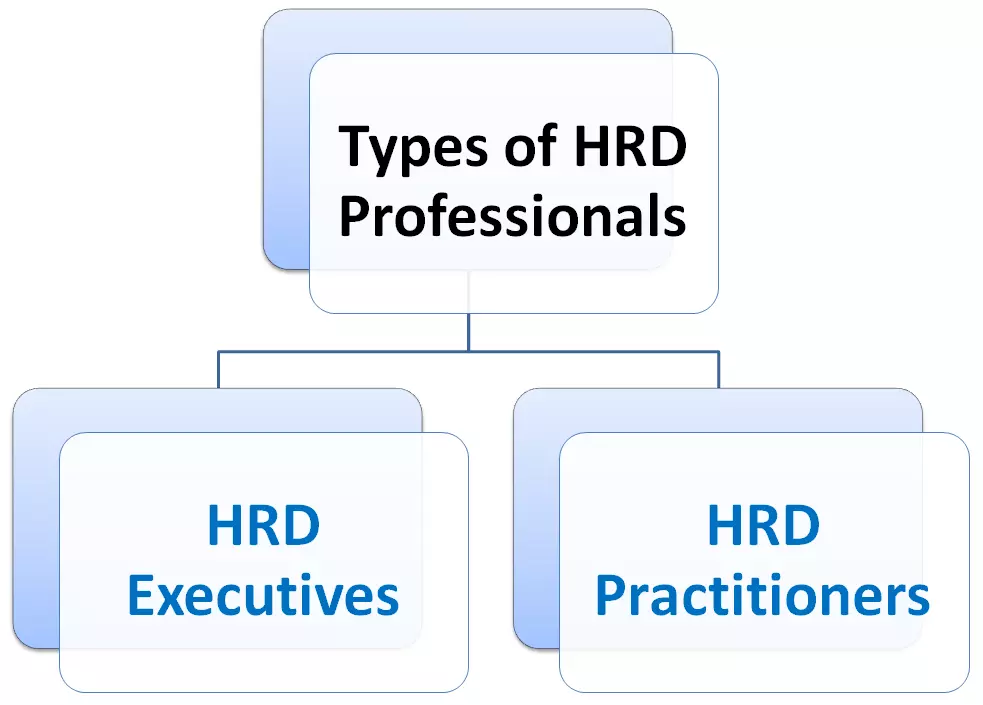Table of Contents:-
- Meaning of HRD Professionals
- Characteristics of HRD Professionals
- Types of HRD Professionals
- Role of HRD Professionals
Meaning of HRD Professionals
Human Resource Development – HRD professionals are drivers of HR and organisational development at an individual, team or organisational level. They are instruments of control as they are responsible for facilitating the socialisation of people in work settings. HRD professionals are analysts, designers, developers, trainers, evaluators, and so on. In short, they are a jack-of-all-trades.
There are two major types of HRD professionals: HRD managers /executives and HRD practitioners. There are two certification exams for HRD professionals, which are offered by the Human Resource Certification Institute (HRCI) (in conjunction with the Society for HRM). They are called the Professional in Human Resource (PHR) and Senior Professional in Human Resource (SPHR) exams.
Characteristics of HRD Professionals
Some of the qualities which an HRD professional should possess to be effective in his field include:
1) The ability to plan for the HRD activities of the organisation; this includes identifying the training and development needs of the employees, designing, implementing and evaluating such programmes, etc. All these HRD activities should be based upon the HRD policy which should be in line with the organisation’s mission and strategy.
2) HRD professionals should be able to establish goal priorities of the HRD activities for the current and future period which may be for the next five years.
3) HRD professionals should be able to seek the most appropriate organisational structure and location for the HRD unit in the overall organisational chart. The role of the manager may be to clarify and communicate the relationship of HRD staff, with other members of the organisation and outsiders when HRD staff will interface.
4) HRD professionals should be able to develop HRD and MIS to provide good internal and external data sources, ensuring overall HRD efficiency.
5) Mission-oriented position description has to be developed for the staff and supporting personnel of the HRD unit.
6) A highly participative style can be followed by the manager in his planning and directing efforts.
7) Respect and confidence can be gained from line managers and peers by being technically competent in the design and delivery of the HRD activities as well as practical and more realistic approaches when the situation demands.
8) Develop confidence in the HRD staff by delegating though it involves an element of risk.
Overall an HRD manager should be able to provide opportunity to each employee for personal and organisational growth as well as treat them with dignity they deserve.
Types of HRD Professionals
Types of HRD professionals are as follows:

1) HRD Executives/Managers
The HRD executive or manager has primary responsibility for all HRD activities. The role of the HRD executive has become more important and visible as organisations address the demands of a global economy. The primary challenge to HRD executives is to redefine a new role for HRD during this period of unprecedented change. Thus, HRD executive is in an excellent position to establish the credibility of HRD programmes and processes as tools for managing in today’s challenging business environment.
2) HRD Practitioners
HRD practitioners are professionals who execute HRD duties through specific rules in the profession. Since HRD practitioners are primarily responsible for employee development, there is a need for them to become more highly skilled to ensure that their practice meets the changing needs of organisations.
Role of HRD Professionals
HRD professionals create a positive and productive work environment, enhance employees’ skills, and support the organization’s strategic goals. The role of HRD Professionals involves Training and Development, Career Development, Performance Management, Organizational Development, Talent Management, Employee Engagement, Learning and Development, Coaching and Mentoring, Strategic HR Planning, Compliance and Legal Issues.
The roles of HRD professionals (HRD executives/managers and HRD practitioners) are as follows:
1) Roles of HRD Executives/Managers
The roles of HRD executives/managers are as follows:
i) Training Role: To develop the needed competencies of various role occupants, the trainer must develop good training considering the curriculum, content, training aids, and learners receptivity. Trainers must keep themselves updated and must have the appropriate technical knowledge.
ii) Research Role: Trainers must identify the competencies that are needed for the accomplishment of the product range and what will be needed in the organisation in the future. The trainers who function as researchers need to develop their insight into the organisational needs and processes. This role is of great help to the organisation.
iii) Consulting Role: In addition to a researcher role, trainers should preferably discharge a consulting role for organisational effectiveness. Various teams, while striving to accomplish tasks, need confirmation The trainers should extend the requisite consultancy to keep the wheels of synergy moving through teamwork.
iv) Change Management Role: Changes are part and parcel of the present-day business scenario. In today’s competitive world, training becomes a true strategic partner. Leadership emerges as the fiscal point and training appears inescapable if leadership is to be developed at all levels. Training becomes essential to enhance the ability of strategic thinking, taking responsibility, feeling countless enhancing creativity, and empowering others. Training is a strategic partner that serves to adorn the organisation. The trainer must be involved in the organisation’s central business, or trainees with exposure in multiple functional areas are to be drawn from within the organisation.
2) Roles of HRD Practitioners
Pat MeLagan identified the following nine essential roles for HRD practitioners to perform, which are explained as follows:
i) HRM Strategie Advisor: In this role, the issues and trends concerning an organisation’s external and internal people are brought to the attention of the strategic decision-makers.
ii) HRM Systems Designer and Developer: This role involves designing and preparing HRM systems for implementation so that HRM systems and actions are mutually reinforcing and have maximum impact on organisational performance, organisational development, and endurance.
iii) Organisation Change Consultant: This role means facilitating the development and implementation of strategies for transforming organisations.
iv) Organisation Design Consultant: This role involves identifying the work required to fulfil organisational strategies. It also involves organising the work so that it makes better use of resources.
v) Learning Programme Specialist: In this role, learning needs are identified to design and develop structured learning programmes and materials in a variety of media formats for self-study and workshops or electronic delivery.
vi) Instructor/Facilitator: This is an increasingly difficult role. In it, information is presented, structural learning experiences are led and group discussions and group processes are facilitated.
vii) Individual Development and Career Consultant: This role involves helping people assess their competencies, values and goals so they can identify, plan, and implement development actions.
viii) Performance Consultant: This role means assisting a group or individuals to add value in the workplace. It is a coaching and consulting role in which HRD people perform analytical and systems-design work.
ix) Researcher: This role involves assessing HRD practices and programmes and their impact empirically. It also communicates results so that the organisation and its people accelerate their change and development.
